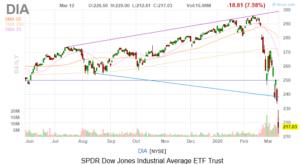With the coronavirus death tally surpassing 1,000 in Italy — the Eurozone’s third-largest economy — and little clarity on when the U.S. will get a handle on the situation, stocks continue sliding in dramatic fashion today, confirming the end of one of history’s most glorified bull markets as of Wednesday.
- The S&P 500 tumbled 9.51%
- The Dow Jones Industrial Average slid 9.99%
- The Nasdaq Composite gave up 9.43%
- Familiar offenders Boeing (NYSE:BA) and Dow Chemical (NYSE:DOW) were vying for the dubious honor of worst-performing Dow stock today, though International Business Machines (NYSE:IBM) was in that ominous mix as well.
There’s an old saying in financial circles that goes something like “history doesn’t always repeat, but it often rhymes.” Assuming that’s true, and it often is, add history to the list of hurdles currently confounding stocks because history says that only twice over the past 93 years — 1966 and 1987 — was a 20% or more decline in the S&P 500 not followed by U.S. economic contraction a year later.
So there’s hope tto cling to, because the recession indicator, like every other indicator, doesn’t come with a 100% rate of repeat. However, hope maybe a dangerous tonic these days when acknowledging that equity markets are leading, not lagging indicators, meaning they’re usually reliable gauges of economic conditions.
And we’re back to a familiar place: not one of the Dow’s 30 member firms were higher in late trading. Worse yet, roughly 10 were saddled with or close to double-digit losses.
Boeing Bad News Continues
At this point, anything even remotely resembling good news regarding Boeing would be shocking. Alas, more bad news it is. Earlier today, JPMorgan downgraded the beleaguered industrial stock to “neutral” from “overweight” while lowering its price target to $160 from $210.
Problem with that price target is it could be violated to the downside while I’m writing this piece or as soon as Friday. At this writing, Boeing resides just over $160 and is on pace for its lowest closing handle since early 2017.
Weird Disney Situation
Any speculation that Disney (NYSE:DIS) would be an anti-coronavirus play due to its streaming exposure has long been out the window, but the stock was among the double-digit loser club today amid some interesting news.
Gov. Gavin Newsom (D-CA) and California health officials recommended that business, groups and anyone else planning a gathering of 250 or more people scrap those events. However, that advisory doesn’t pertain to theme parks, including Disneyland in Anaheim, Calif..
That’s all well and good, but DIS stock paints a picture of markets suspecting that no one wants to go to Disneyland and Disney World amid the COVID-19 outbreak. Even if they do, it’s raining in Southern California and that should rightly keep some folks at home.
Misplaced Rosy Assumptions
Visa (NYSE:V) was pounded today, though it wasn’t in the double-digit loser club, after Piper Sandler analyst Christopher Donat said outlooks from Visa and rival Mastercard (NYSE:MA) are too optimistic given the coronavirus outbreak.
“We now expect COVID-19 to have a more negative impact,” said Donat in a note to clients. “We now think that the revised outlooks for both companies are overly optimistic…However, with the virus spreading to Europe and North America, we now expect impacts not just on cross-border activity but also on domestic spending activity”
Weakness in V and MA today could easily be one reason why American Express (NYSE:AXP) was one of the worst-performing Dow stocks on Thursday as well.
Caterpillar Cranks Lower
Confirming speculation that the global economy is under substantial duress, Caterpillar (NYSE:CAT) slumped 9% reported the weakest machine sales since late 2016.
CAT stock is lower by about 40% year-to-date and the industrial machinery giant is off to its worst start to a year since 2009.
Bottom Line on the Dow Jones Today
Arguably the biggest risk now facing stocks, beyond the obvious of lack of COVID-19 containment, is that monetary policy response to the situation isn’t being embraced by investors. Today, the Federal Reserve said it plans to inject at least $1 trillion into the banking system as soon as next week and it’s pledging to buy more bonds.
However, today’s market action suggests investors want more and after a recent 50-basis point interest rate cut was greeted with muted reaction, the Fed may have no choice but to buy more bonds in a bid to stave off a lengthy recession.
As of this writing, Todd Shriber did not own any of the aforementioned securities. He has been an InvestorPlace contributor since 2014.
